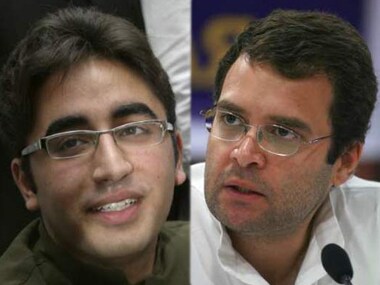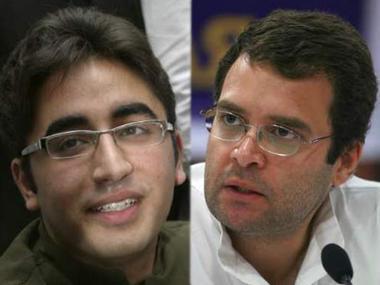Bilawal Bhutto — the son of late Benazir Bhutto — is hogging headlines these days. The 26 year old is in the news for raising the Kashmir and India bogeys in his public rallies — themes that resonate with the masses of Pakistan. This is a travesty which, among other things, reflects the fact that India and Pakistan continue to view each other as the others. ‘Other’ — a foil against which to define their respective identities — and the legacy of old, hackneyed and sterile politics. One would have respected a different genre of politics with the arriving on the scene of new, young politicians but it would appear that these politicos carry on, even more trenchantly, (at least, rhetorically) the legacy of the old. This perhaps reflects another bane of the subcontinent — dynastic politics, wherein the heirs of erstwhile politicians aspire (and even occupy) for highest political offices without earning these. Bilawal’s case makes this trend all the more acute and even insidious. [caption id=“attachment_1767089” align=“alignleft” width=“380”]  Bilawal Bhutto and Rahul Gandhi. Ibnlive[/caption] Bilawal Bhutto has nothing much to show; he is not a man of the masses, neither has he demonstrated political sagacity or acumen. He is an aristocrat who is trying to carve out a niche for himself in Pakistan’s political firmament. And he is taking short cuts to do this. The best short cut, of course, is to rake the Kashmir issue and the India bogey. This sells but alas is a short term, short sighted, populist measure designed to reap political rewards and office. It could be that Bilawal is his own man or it could be that he is the front man for his father — indicted on several corruption charges. Either way, the young man’s approach is flawed and warped. If Bilawal really cared for Pakistan and its people, the issues he could raise would be of a different nature and genre. He would identify the structural and existential problems besetting Pakistan, offer remedies and lasting solution for these and then present these to the masses. But, alas, immediate, populist rewards would not accrue from this approach. It would require patience, sagacity, wisdom and prudence. The easy short cut then is obvious: rake up the Kashmir issue. Will this approach shore up the fortunes of the Pakistan Peoples Party (PPP)? Will the party be at the forefront of Pakistan’s politics? Unlikely is the answer. Pakistan, while it is recognised is in the midst of structural and existential crises, is also in transition. Different forces and ideas jostle for space and contend the idea, nature and direction of Pakistan. The country is in a very fluid state and can go anywhere. What this means is that traditional political forces and alignments of the country do not speak to Pakistan’s contemporary condition and drift. New constellations may emerge that take the country in altogether different directions. These could be either alarming or salubrious. The PPP then faces a different structural and political reality. Parroting old ideas and themes may work for the hard core and die hard segment of the party but would not do anything to take Pakistan out of the morass it is in. It is then a travesty that the scion of the Bhutto family chooses to focus on something that may have emotive resonance in Pakistan but does nothing to resolve the country’s problems. Does this accrue only from dynastic politics? Or are there profounder forces at work? A bit of both may be the answer. Path dependence of ideas and institutions flowing from these may account for the reasons for sclerotic approaches to politics. This may be strengthened by dynastic politics and politicians who do not feel the need for fresh approaches. This is bane afflicting not only Pakistan but perhaps most lesser developed nations and regions. The antidote to this is expansive education for the masses and democratisation of processes and institutions and the primacy of reason in public affairs. Can this end state of affairs crystallise in the subcontinent? Maybe. It may ultimately be time that will be the arbiter of this. Till then expect more Bilawal’s and his clones who will rake up issues premised on populism and jingoism. Sober, prudent politics, public policy and interstate politics will descend on the sub-continent only after a paradigm shift both amongst the leaders and the led.
Bilawal Bhutto has nothing much to show; he has not demonstrated political acumen. He is an aristocrat who is trying to carve out a niche for himself.
Advertisement
End of Article


)

)
)
)
)
)
)
)
)



